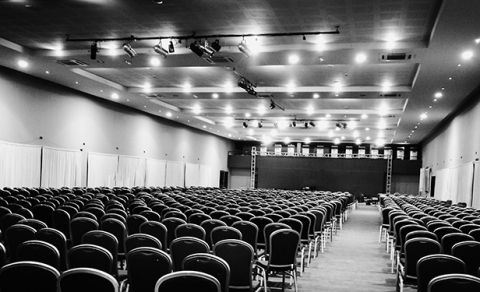CEIR Poll Shows COVID-19 Impact on U.S. B2B Trade Show Organizers

During its April 22 webinar, “Navigating the COVID-19 Crisis Landscape,” the Center for Exhibition Industry Research provided a sobering yet hopeful glimpse into what the trade show industry’s recovery could look like post-COVID-19. CEIR officials shared industry insights from the results of a recent industry poll, while Allen Shaw, Ph.D., chief economist with Global Economic Consulting Associates, provided an update about the industry’s anticipated recovery from the pandemic.
“COVID-19 has had a profound impact on the U.S. business-to-business exhibition industry,” said Cathy Breden, CEO of CEIR. “The survey providing insights from the B2B exhibition organizer perspective, and Dr. Shaw’s insights relating to when the economy is expected to rebound, offer a very valuable understanding of where our industry is today, and the outlook moving forward.”
Fielded earlier this month, the CEIR COVID-19 Impact and Recovery Survey invited U.S. B2B exhibition executives to give their perspectives on how COVID-19 has impacted their staff, operations and events, along with the areas they plan to address based on the hard business lessons learned from the pandemic.
Here are some of the key findings:
· Organization staff largely remain intact, yet if the pandemic persists, pay and staff cuts could deepen in the next 3-6 months. Currently, only 16 percent of event organizers have cut pay and fewer have furloughed or laid off staff.
· Eighty-six percent of executives are working aggressively at revising their budgets to contain costs and retain revenues, while the brunt of lost revenues is being passed on to suppliers, via renegotiated (61 percent), or cancelled contracts (55 percent). This approach is a product of many event organizers cancelling, postponing or doing both for trade shows originally scheduled for 2020.
· Though the situation is gloomy, 2020 will not be a total loss if COVID-19 is brought under control. Forty-one percent of organizers report postponing events, with the bulk scheduled to take place starting in August and running through November. Among these organizers, roughly 30 percent will host postponed events during one of these months, while 34 percent of organizers have postponed their events to 2021.
· Executives are considering options to shift to alternative event content or models if a physical event is unable to take place in the future due to an unexpected disaster. Moving forward, there will be extensive experimentation with virtual options, including switching to digital-only solutions or adopting hybrid events.
· Executives are very sensitive to the importance of creating and implementing hygiene protocols that make participants feel safe. They understand that these accommodations are critical to the recovery of the industry once the market for trade shows reopens.
Insights from CEIR’s Economist on the U.S. Economy
Shaw’s analysis focused on when the U.S. economy is expected to rebound, which must happen before the U.S. B2B exhibition industry can re-open and recover. The economic recovery depends on gaining control of the virus, as tracked by the number of new confirmed COVID-19 cases, he said.
Recent data indicates that new confirmed cases in the U.S. appears to have passed the peak. Due to lockdown across the country, all economic indicators currently point to a sharp decline in economic activities. Even though economic indicators are as bad — if not worse — than those of the Great Depression, the underlying economic fundamentals and causes are different, Shaw explained.
“The recession we are experiencing now is caused by a supply shock,” he said. “By comparison, it was a shock in demand that triggered the Great Depression of the 1930s and Great Recession of 2008. Supply shocks today include the economic lockdown due to stay-at-home orders, supply-chain disruptions, lower productivity of working staff and mortality.”
According to Shaw, when the economy reopens, more than half of the problem of the current recession will be solved. With monetary and fiscal policies in place injecting money in the system and elevating demand for goods and services, and as business and consumer confidence is restored, Shaw said he expects the economy will see a “V-shape” (i.e., a quick recovery) once it begins.
According to CEIR officials, a full recovery is expected in eight quarters, with GDP in the fourth quarter of 2021 exceeding the previous peak in the fourth quarter of 2019.
For a more in-depth look and discussion of the survey results along with Shaw’s insights regarding the U.S. economy and B2B exhibition industry, go here to access the recorded version of the webinar, which was sponsored by GES.
Don’t miss any event-related news: Sign up for our weekly e-newsletter HERE and engage with us on Twitter, Facebook, LinkedIn and Instagram!


Add new comment